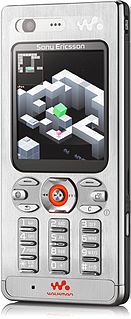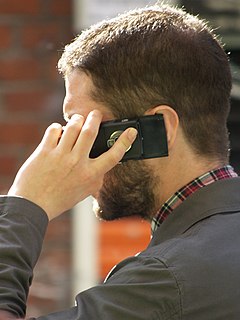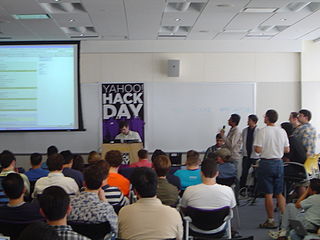Related Research Articles

A tricorder is a science fiction prop designed for the Star Trek television series by Wah Chang. In the story universe the multifunction hand-held device performs sensor environment scans, data recording, and data analysis--hence the word "tricorder" to refer to the three functions of sensing, recording, and computing. In Star Trek stories the devices are issued by the fictional Starfleet organization.

A mobile game is a video game that is typically played on a mobile phone. The term also refers to all games that are played on any portable device, including from mobile phone, tablet, PDA to handheld game console, portable media player or graphing calculator, with and without network availability. The earliest known game on a mobile phone was a Tetris variant on the Hagenuk MT-2000 device from 1994.

The antennas contained in mobile phones, including smartphones, emit radiofrequency (RF) radiation ; the parts of the head or body nearest to the antenna can absorb this energy and convert it to heat. Since at least the 1990s, scientists have researched whether the now-ubiquitous radiation associated with mobile phone antennas or cell phone towers is affecting human health. Mobile phone networks use various bands of RF frequency, some of which overlap with the microwave range. Other digital wireless systems, such as data communication networks, produce similar radiation.

A hackathon is a design sprint-like event; often, in which computer programmers and others involved in software development, including graphic designers, interface designers, project managers, domain experts, and others collaborate intensively on software projects.

A virtual keyboard is a software component that allows the input of characters without the need for physical keys. The interaction with the virtual keyboard happens mostly via a touchscreen interface, but can also take place in a different form in virtual or augmented reality.

The Baskin School of Engineering is the school of engineering at the University of California, Santa Cruz. It consists of six departments: Applied Mathematics, Biomolecular Engineering, Computational Media, Computer Science and Engineering, Electrical and Computer Engineering, and Statistics.
The Association of Biomolecular Resource Facilities (ABRF) is dedicated to advancing core and research biotechnology laboratories through research, communication, and education. ABRF members include over 1700 scientists representing 340 different core laboratories in 41 countries, including those in industry, government, academic and research institutions.

David J. Lipman is an American biologist who from 1989 to 2017 was the Director of the National Center for Biotechnology Information (NCBI) at the National Institutes of Health. NCBI is the home of GenBank, the U.S. node of the International Sequence Database Consortium, and PubMed, one of the most heavily used sites in the world for the search and retrieval of biomedical information. Lipman is one of the original authors of the BLAST sequence alignment program, and a respected figure in bioinformatics. In 2017, he left NCBI and became Chief Science Officer at Impossible Foods.
Mobile ticketing is the process whereby customers order, pay for, obtain, and validate tickets using mobile phones. A mobile ticket contains a verification unique to the holder's phone. Mobile tickets reduce the production and distribution costs associated with paper-based ticketing for operators by transferring the burden to the customer, who is required to contribute the cost of the physical device (smartphone) and internet access to the process. As a result of these prerequisites, and in contrast to paper-based systems, mobile ticketing does not follow the principles of universal design.

GISAID is a global science initiative and primary source established in 2008 that provides open-access to genomic data of influenza viruses and the coronavirus responsible for the COVID-19 pandemic. On January 10, 2020, the first whole-genome sequences of SARS-CoV-2 were made available on GISAID, which enabled global responses to the pandemic, including the development of the first vaccines and diagnostic tests to detect SARS-CoV-2. GISAID facilitates genomic epidemiology and real-time surveillance to monitor the emergence of new COVID-19 viral strains across the planet.
PhonePe is an Indian digital payments and financial services company headquartered in Bangalore, India. PhonePe was founded in December 2015, by Sameer Nigam, Rahul Chari and Burzin Engineer. The PhonePe app, based on the Unified Payments Interface (UPI), went live in August 2016.
Samuel Ken-En Gan is an ethnic Chinese Singaporean multi-disciplinary biomedical scientist, psychologist, writer, Christian apologist, and educator. His current main position is the Senior Principal Investigator of the Antibody and Product Development (APD) Lab within the Agency of Science, Technology and Research (A*STAR). He is also an adjunct associate professor and also associate senior lecturer in a few teaching institutions, and founded a startup for scientific phone apps, consultancy, research and educational kits in 2017, which was setup to house the first and only specialized journal “Scientific Phone Apps and Mobile Devices” on mobile apps and IoT devices transferred from SpringerNature, as well as a newly set up open-access student journal “APD Trove”, also in 2017. Gan serves as founding Editor-in-Chief for both journals and is associate editor for Frontiers in Immunology, Frontiers in Virology, and guest editor for the 'Methods and protocols' journal by MDPI and Frontiers in Psychology,.
Ramasubbu Sankararamakrishnan is an Indian computational biologist, bioinformatician and a professor at the Department of Biological Sciences and Bioengineering of the Indian Institute of Technology, Kanpur. He is known for his computational studies on membrane protein function. The Department of Biotechnology of the Government of India awarded him the National Bioscience Award for Career Development, one of the highest Indian science awards, for his contributions to biosciences in 2008.

The COVID-19 pandemic has affected many scientific and technical institutions globally, resulting in lower productivity in a number of fields and programs. However, the impact of the pandemic has led to the opening of several new research funding lines for government agencies around the world.

COVID-19 apps include mobile-software applications for digital contact-tracing - i.e. the process of identifying persons ("contacts") who may have been in contact with an infected individual - deployed during the COVID-19 pandemic.
The (Google/Apple) Exposure Notification (GAEN) system, originally known as the Privacy-Preserving Contact Tracing Project, is a framework and protocol specification developed by Apple Inc. and Google to facilitate digital contact tracing during the COVID-19 pandemic. When used by health authorities, it augments more traditional contact tracing techniques by automatically logging encounters with other notification system users using their Android or iOS smartphone. Exposure Notification is a decentralized reporting based protocol built on a combination of Bluetooth Low Energy technology and privacy-preserving cryptography. It is used as an opt-in feature within COVID-19 apps developed and published by authorized health authorities. Originally unveiled on April 10, 2020, it was first made available on iOS on May 20, 2020 as part of the iOS 13.5 update and on December 14, 2020 as part of the IOS 12.5 update for older iPhones. On Android, it was added to devices via a Google Play Services update, supporting all versions since Android Marshmallow.

Digital contact tracing is a method of contact tracing relying on tracking systems, most often based on mobile devices, to determine contact between an infected patient and a user. It came to public prominence in the form of COVID-19 apps during the COVID-19 pandemic. Since the initial outbreak, many groups have developed nonstandard protocols designed to allow for wide-scale digital contact tracing, most notably BlueTrace and Exposure Notification.
DreamLab is a volunteer distributed computing mobile Android and iOS app launched in 2015 by Imperial College London and the Vodafone Foundation.
SwissCovid is a COVID-19 contact tracing app used for digital contact tracing in Switzerland. Use of the app is voluntary and based on a decentralized approach using Bluetooth Low Energy and Decentralized Privacy-Preserving Proximity Tracing (dp3t).
Various kinds of software have been developed and used for mitigating the COVID-19 pandemic. These include mobile apps for contact tracing and notifications about infection risks, digital passports verifying one's vaccination status, software for enabling – or improving the effectiveness of – lockdowns and social distancing in general, Web software for the creation of related information services, and software for the research and development for COVID-19 mitigation.
References
- ↑ "Bioinformatics Institute". www.bii.a-star.edu.sg. Retrieved 2017-08-03.
- ↑ "Bioinformatics Institute".
- ↑ "Bioinformatics Institute - Featured on Influenza Initiative" (PDF).
- ↑ "Scientific Phone Apps and Mobile Devices". Scientific Phone Apps and Mobile Devices. Retrieved 2017-08-03.
- ↑ Khalik, Salma (15 January 2021). "Punching above its weight in global fight against Covid-19". The Straits Times. Retrieved 12 September 2021.